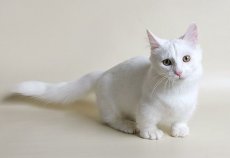New publications
Compulsive scratching, licking and chewing in cats
Last reviewed: 04.07.2025

All iLive content is medically reviewed or fact checked to ensure as much factual accuracy as possible.
We have strict sourcing guidelines and only link to reputable media sites, academic research institutions and, whenever possible, medically peer reviewed studies. Note that the numbers in parentheses ([1], [2], etc.) are clickable links to these studies.
If you feel that any of our content is inaccurate, out-of-date, or otherwise questionable, please select it and press Ctrl + Enter.

Let's look at the main reasons why a cat might bite, chew or scratch itself.
Most cats groom themselves meticulously. But what happens when they do it excessively? For a variety of reasons, licking, scratching, and chewing becomes obsessive, which can be annoying to you and damaging to your pet's fur and skin.
If your cat compulsively scratches, licks, or chews itself, you've probably caught it doing it regularly. But if you haven't noticed, the first sign may be a loss of hair, often along the cat's back and belly. Cats with this behavior may also develop red, irritated patches called lesions, but this is less likely than in dogs.
Although compulsive scratching, licking, or chewing can occur in any animal, it is most commonly seen in Siamese cats and other Oriental breeds. Females are more likely to lick, chew, and pull fur than males.
Since there are a number of medical conditions that can lead to excessive scratching and licking, be sure to consult with your veterinarian to help determine the cause and the best course of action.
Why do cats compulsively scratch, lick and chew themselves?
Parasites. Fleas are often the cause of compulsive scratching and licking in cats. Since cats are excellent groomers, they can actually remove all traces of fleas. If you notice your cat licking his lower back excessively or has scabs on his neck, this is a sign that fleas may be the cause of the problem. Other parasites, including mites, ticks, and ringworm, can also contribute to scratching, licking, or chewing.
Allergies: Just like people who develop skin irritations in response to certain foods or environmental factors, cats can have itchy, irritated skin if they are allergic to something in their environment.
Dry Skin: Dry winter air or poor nutrition can cause skin to become dry and flaky, causing your cat to lick or scratch to relieve the condition.
Pain: If you notice your cat licking or biting itself in the same spot over and over again, it may be because it is experiencing pain or discomfort in that area.
Boredom, anxiety, and compulsive disorder. Compulsive chewing, scratching, and licking often develop in cats that are bored, depressed, or anxious. These mental disorders are more likely to occur in cats that live indoors, which may be because they are less active and experience fewer emotions than outdoor cats. Compulsive disorders often begin when there are changes in the cat’s environment, including the introduction of a new pet or baby into the home, or a move to a new location. Also, behaviors that developed in response to illness sometimes become compulsive after recovery.
Treatment for compulsive scratching, licking and biting
Treat for parasites. Because it can be difficult to diagnose a flea infestation in cats, some veterinarians recommend trying a reliable flea control product, available from your veterinarian, for six to eight weeks to see if it reduces the frequency of licking, scratching, or chewing. Likewise, treating for itch mites and other existing parasites can help relieve your cat's discomfort and problematic behavior.
Substituting Foods: Putting a cat that exhibits compulsive behavior on a six-week elimination diet is a good way to find out if a food allergy is the culprit. You may have to try several variations before you find a diet that works. Veterinarians may also prescribe a supplement of certain fatty acids or other nutritional supplements if dry skin is the cause of your cat's endless scratching and licking.
Use of medications. Depending on the extent of the skin damage caused by licking, chewing or scratching, your veterinarian may prescribe the use of steroids, antihistamines and antibiotics. In addition, some types of obsessive behavior in cats caused by psychological factors can be treated with clomipramine (an antidepressant) or amitriptyline, which helps combat anxiety and also acts as an antihistamine.
Managing anxiety or boredom. If you and your veterinarian have determined that there is no physical cause for your cat’s behavior, there are things you can do to improve your cat’s mental state. It is important to make sure your cat feels safe, comfortable, and loved in your home, as this provides plenty of stimulation and exercise. You may find that desensitizing your cat by slowly and carefully exposing it to what it fears can be helpful. Do this gradually to avoid overwhelm-ing your cat and making the compulsive licking, scratching, and biting worse. Counter-conditioning, by teaching your cat to associate something pleasant, such as a treat, with what it fears, can also help reduce stress and anxiety. Often, boredom-induced licking (also known as psychogenic alopecia) is alleviated by introducing another cat or another pet. But there is always a risk that a second cat will cause further stress to your pet, which could worsen hair loss.
